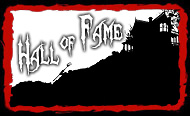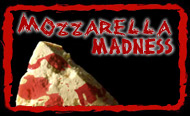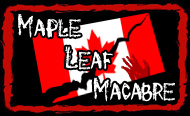
Last House on Massacre Street (1973)
Studio: Code Red
Release date: May 30th, 2017
Reviewed by: Brett Gallman (@brettgallman)
The movie:
A title like Last House on Massacre Street carries certain expectations, which is exactly why some enterprising distributor decided to rebrand this film—originally released as The Bride—in an effort to ride the coattails of Wes Craven’s notorious shocker. It wasn’t the first to do so, nor would it be the last, but it’s arguably the least deserving of the bunch, at least in terms of tone and content. Where these titles are usually attached to grungy, genuinely unpleasant efforts soaked in revenge and gore, Massacre Street is an oddball dispatch that nods in such a direction before delivering weird, existential horror. And while that doesn’t make it a great film, it does make it a surprising one that leaves you wondering how this straightforward little revenge tale escalated to such psychotronic madness.
Barbara (Robin Strasser) is very much daddy’s little girl. And since daddy (John Beal) is very rich, that means she’s entitled to, well, anything. At first, this involves a house—and not just any house. Barbara wants to build her own house, her lack of architectural knowledge be damned. When her father consents to this, she decides she needs a man to fill it with. Eventually, she settles on David (Arthur Roberts), one of her father’s employees, and, despite his best efforts to warn her off, he relents there, too. Little oddities—such as a devious match-cut that splices together shots of Barbara kissing David and her father at separate moments—hint that she might be a little off. One minute, Barbara and David are longingly gazing at their future home; the next, they’re tying the knot in a lavish backyard wedding. David, however, seems to be distracted by another woman, an old flame named Helen (Iva Jean Saraceni). Before the newlywed couple can even cut the cake, Barbara walks in on her husband making out with this other woman. Enraged, she stabs Helen with a pair of scissors, stumbles back outside in her blood-spattered wedding dress, and flees the scene.
Charting the rest of Last House on Massacre Street should be easy enough—hell hath no fury and all that, you know. But there’s something strange—okay, more strange—about the fallout from this wedding day gone horribly awry. A week passes, and no one hears from Barbara—not her father, not her husband, who has shacked up with Helen in the meantime. If this is really going to be a sordid revenge tale, it certainly is taking its time, so much so that it even features an oddly congenial meeting between David and Barbara’s father. At first, it feels like typical bullshit exploitation movie chatter to pad out the runtime and stall until it delivers the good stuff, but even this conversation takes an odd turn towards Barbara’s childhood and how she once tortured a chicken to death before slicing its head clean off. Message sent: David is fucked.
But just how it’s going to happen remains up in the air for most of Last House on Massacre Street, a film that warbles along to what feels like an inevitable conclusion. Strange asides thankfully break up the monotony of stilted conversations between David and Helen about what they’re going to do about the obviously batshit insane Barbara, who’s poised to return and wreck their shit anytime now. Maybe. For a good 30 minutes or so, that possibility is there, as the two receive strange, ominous phone calls. At one point, the horse’s head gag from The Godfather is re-enacted with poultry, just in case you were wondering if that earlier anecdote about the chicken was a threat or not. This is the stuff you come to see from a movie bearing the title Last House on Massacre Street, and there’s just enough of it to keep the film treading water towards that titular bloodletting.
What’s even more interesting, though, is the weird, almost ethereal freak out rumbling beneath the surface. Both David and Helen are haunted by strange dreams—he finds himself lost in the bizarre funhouse that is Barbara’s geometrically-challenged house during these wonderfully strange sequences captured via canted angles and fish-eye lenses. Helen’s dreams are similarly eerie, dominated by the indelible image of a ghastly Barbara wearing her blood-stained wedding dress. Loud, screeching guitar riffs accompany these visions, bringing the film out of its slumber, perhaps hinting that this Last House is about to host a gnarly, gory party—if not a massacre, even.
Director Jean Marie Pélissié and co-writer John Grissmer (Blood Rage) have other ideas, though. They do at least transport the audience to Barbara’s asymmetric house of horrors, where secrets and twists lurk, though very few of them may be in line with expectations. And that’s okay—truth be told, Last House on Massacre Street is much more interesting than those expectations. Movies with vengeful women are a dime-a-dozen; movies featuring the likes of Barbara and her dear old dad are much rarer. Considering the utter madness that is Blood Rage, it’s not surprising Grissmer scripts a wild tangent of a climax, one that finds the film ascending to another sort of plane. It’s wise to ignore the rebranding altogether since this one has less in common with the Last House bunch and more in common with lo-fi, sleepy supernatural oddities like Carnival of Souls.
The last fifteen minutes or so are a terrific exercise in coaxing no-budget freak-outs from the power of suggestion and a few remarkable images. They’re also a fine reminder that it’s best to just go ahead and unleash a climax even if your film has barely met the pesky “feature film runtime” requirement: at 75 minutes long, Last House on Massacre Street is just able to skate by with its peculiar brand of existential vengeance. It might not take you where you thought it would, but, sometimes, those are the best trips.
The disc:
After showing up in a handful of public domain collections under various titles, Last House on Massacre Street arrives in more official form on a double-feature Blu-ray from Code Red. There are no extra features to illuminate the history of this odd title, but the presentation is solid, with even some of the flaws proving to be charming. For example, the sound cuts out completely when the Last House title card appears, drawing attention to its status as an awkward, rebranded insert. Accompanying the film on the disc is Wild Little Bunch (aka Existence) about a struggling working-class mother and her 14 (!) children. It is perhaps most notable for being directed by David Hemmings, which is just about the only reason I can come up with to account for its placement here. Somehow, that’s just as well since a film like Last House on Massacre Street deserves strange bedfellows. Maybe this isn’t the most logical Code Red double feature, but it is thankfully among its cheaper offerings. Massacre Street alone is worth the $17 price tag, as, like Barbara herself, it seems agreeable enough, yet harbors secrets and surprises that will punish you for underestimating it. comments powered by Disqus Ratings:








